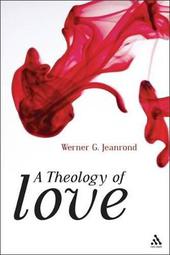
|
A Theology of Love
Paperback / softback
Main Details
| Title |
A Theology of Love
|
| Authors and Contributors |
By (author) Prof Dr Werner G. Jeanrond
|
| Physical Properties |
| Format:Paperback / softback | | Pages:312 | | Dimensions(mm): Height 234,Width 156 |
|
| Category/Genre | Christian theology
Theology |
|---|
| ISBN/Barcode |
9780567646927
|
| Classifications | Dewey:241.4 |
|---|
| Audience | |
|---|
|
Publishing Details |
| Publisher |
Bloomsbury Publishing PLC
|
| Imprint |
T.& T.Clark Ltd
|
| Publication Date |
21 January 2010 |
| Publication Country |
United Kingdom
|
Description
This book explores the different dimensions of Christian love. It argues that all expressions of love are wrestling with the challenge of otherness.
Author Biography
Professor Werner Jeanrond is Master of St Benet's Hall at the University of Oxford, UK.
ReviewsFrom the Bible to Pope Benedict XVI, and drawing from literatures in half a dozen languages, Werner Jeanrond tracks the development of Christian thinking about love, its varieties and its controversies. This is far more than mere history, however, since through it runs a salutary, ecumenical argument for transcending the Lutheran dichotomy between divine agape and human eros, so as to recover the creative calling and potential of human love. Nor is it just about ideas, but also about the institutions--family, marriage, friendship, church--which can cultivate the praxis of love in a culture whose individualism has kicked away so many social supports. "A Theology of Love" is a broad education, characteristically generous in spirit, rich in substance, and refreshingly uncluttered in style. -- Nigel Biggar, Christ Church, Oxford, UK. Love is a key concern in Christianity, and talking about love as a matter of identity is currently in vogue. Yet there are few attempts to write a comprehensive theology of love. Jeanrond offers a both critical and multifaceted contemporary theology of love taking as its lead that "love is praxis, not an object of belief or a principle of reason". He reminds us that not only love, but also a theology of love has a history, and that - although only persons can love - love needs institutions. Jeanrond's Theology of love forcefully points to the embodied and embedded character of love. -- Arne Gron, Faculty of Theology, University of Copenhagen In this masterful account of the journey of love in Christian theology, Jeanrond combines rich historical analysis with a hermeneutics of suspicion to propose a new and refreshing theology of love which does not shun human embodiment and desire. Critically attuned to the ways in which the notion of love has often served Christian exceptionalism, Jeanrond points to the continuities between Hebrew, Greek and Christian conceptions of love, and to the dynamic interaction between secular and religious approaches to thus offer a more inclusive and broadly pertinent Christian vision. -- Catherine Cornille, Professor of Comparative Theology [Jeanrond's] prose brings his subject matter to life. He displays intimate familiarity with his topic, seamlessly weaving his chosen thinkers into his discussion, and he consistently references his focal points without being repetitive or pedantic. This text would be a welcome addition to any university library. Because the work assumes some familiarity with the Christian theological tradition, it is best suited for use with advanced undergraduate or graduate students. -- INTAMS review - Journal for the Study of Marriage & Spirituality ... this text is recommended for its style, substance, and ability to make people re-examine how it is that they approach such an important topic within religion as what it means to participate in the act of love. -- Reviews in Religion & Theology From the first pages of this book Professor Jeanrond states his intention to offer praxis - how we 'do' love - rather than describing, however completely, a history or dogmatic theory. Love is now described in its institutional and political manifestations: Church, family, friendship, chastity, and sexuality. Love now offers a challenge to charity, to the individual, to global and ecclesial society. Love informs those individual and collective relationships by which we are fulfilled. Love is that which guides all interaction including our interaction with God. It is in this framework that Jeanrod explores the doctrines of creation, salvation, and forgiveness, revealing the self-giving love of God. Sensitive to the questions of our time, the tone of this section is more reflective on pastoral and spiritual concerns, showing that theology need not be separated into kerygmatic or dogmatic categories but is at its best when it endeavours to embrace both. No-one who gives time to this seriously well-researched work will ever again lazily use the word Love. Instead, they will find this book to be an indispensible tool in understanding more clearly both the human and religious experience of, and language about, love. -- Jim Lawlor * The Furrow *
|